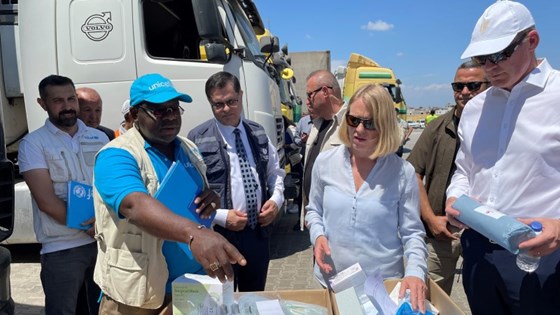Providing life-saving humanitarian aid to Syria
Press release | Date: 09/01/2023 | Ministry of Foreign Affairs
The UN Security Council has adopted a resolution allowing the continued delivery of cross-border humanitarian aid from Türkiye into Syria. This will ensure that help reaches millions of Syrians in need of assistance. Norway and Ireland led the negotiations on the resolution.
The negotiations lasted several weeks and were particularly intensive during the last week of 2022, which was also the final week of Norway’s and Ireland’s terms as elected members of the Security Council. The members of the Security Council voted on the draft resolution today and it was adopted unanimously. The resolution extends the mandate for cross-border aid delivery from Türkiye into northwestern Syria until 10 July 2023.

‘Norway’s effort to secure the adoption of this resolution was one of its most important contributions to the work of the UN Security Council. Over four million people in northwestern Syria are in dire need of aid and are dependent on the assistance provided under the UN cross-border operation. They are in desperate need of food, water, healthcare and sanitation, shelter, and education, which is why it is so important that the mandate has been extended,’ said Minister of Foreign Affairs Anniken Huitfeldt.
During their term on the UN Security Council (2021–2022), Norway and Ireland were co-penholders on the Syrian humanitarian file. A Security Council resolution is essential to enable the UN to continue to deliver humanitarian assistance across the border from Türkiye to over four million people in northwestern Syria. Norway and Ireland have succeeded in securing agreement on an extension of this mandate three times: in July 2021, July 2022 and now again in December 2022.
Under the UN-led operation, as many as 1 000 lorries have transported humanitarian supplies such as water, food, medicines and tents into northwestern Syria via the Bab-al-Hawa crossing every month. Minister of Foreign Affairs Huitfeldt visited the Turkish side of the border crossing in June 2022 and met UN personnel, other humanitarian aid workers and representatives of the Turkish authorities. Ms Huitfeldt also had the opportunity to see how the supplies are checked and packed before being transported across the border.
‘I greatly appreciate the vital efforts being carried out by the UN and humanitarian organisations. This work is saving lives,’ said Ms Huitfeldt after her visit to the border.
The humanitarian situation in Syria has steadily deteriorated since the war started in 2011. According to UN estimates, over 15.3 million people in Syria, a record-high number, are now in need of humanitarian assistance.
At the same time, the climate for cooperation in the Security Council has become more difficult and less predictable since Russia’s invasion of Ukraine nearly one year ago. There has been ongoing uncertainty as to whether Russia would continue to support an extension of the Council’s mandate.
‘The scale of the humanitarian crisis is increasing and efforts to find a political solution are deadlocked. There will be an enormous need for humanitarian aid for a long time to come. Norway calls on the Syrian authorities to facilitate safe humanitarian access to all parts of Syria, including the northwestern region. Norway also supports long-term efforts relating to access to water and sanitation, mine clearance and food production, among other things. We also support the work being done by UN Special Envoy Geir O. Pedersen to promote progress in the political process,’ said Foreign Minister Huitfeldt.
Substantial humanitarian support from Norway
Norway is one of the largest donors of humanitarian assistance to people affected by the conflict in Syria. Since 2011, Norway has provided over NOK 16.5 billion to the civilian population in Syria and neighbouring countries.
In 2023, Norway will provide approximately NOK 1.5 billion. Most of Norway’s humanitarian aid is channelled through the UN, the International Red Cross and Red Crescent Movement and Norwegian humanitarian organisations.